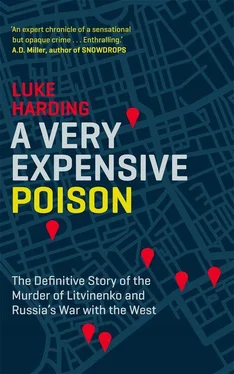The Buk was photographed parked in a residential street in Snizhne. It’s seen next to a shop, ‘Olimpstroi’. Video captures it on the move too, transported on a lorry with a white cab, and rolling past a billboard. The missiles are clearly visible. The body is painted green, the arrow-shaped tips creamy white. As it drives past, a wood pigeon flaps from a hedge across the road.
According to Bellingcat, a team of investigative journalists, the Buk began its journey in Russia. It was part of a convoy that set off in late June from the Kremlin’s 53rd anti-aircraft missile brigade in the city of Kursk. Social media postings by Russian soldiers chart its progress towards the Ukrainian border. By the afternoon of 17 July it was in separatist hands.
At 5.50 p.m. Moscow time, Strelkov sent out a tweet. It was headlined: ‘Message from the militia’. The message’s tone was self-congratulatory: the rebels, Strelkov said, had shot down another Ukrainian transport aircraft. Posted on Vkontakte, the Russian social media site, it said:
We just downed a plane, an AN-26, in the vicinity of Torez. It’s lying somewhere near the ‘Progress’ mine.
We warned them – don’t fly in ‘our sky’.
Here’s video confirmation of the latest ‘bird drop’.
Strelkov posted two videos confirming the crash – taken from a distance and showing a plume of thick black smoke. He described the plane as a ‘bird’. It had fallen, he wrote, on a slag-heap, far away from any residential areas. ‘Innocent people weren’t hurt,’ he added.
Forty minutes later, Strelkov deleted the tweet. Rebels arriving at the crash site, 9 miles (15 km) from Snizhne, discovered a scene of utter horror: wreckage, bodies, plane seats. There were dead women. Dead children. They found passports – one belonging to an Indonesian student. The debris included clothes, toys, luggage. The signage from the plane said: ‘Malaysian Airlines’.
Audio intercepts, released by Ukraine’s intelligence agencies, show Igor Bezler, a DNR commander, discussing what happened with Vasili Geranin, a Russian colonel from GRU military intelligence. Bezler tells Geranin: ‘We just shot down a plane.’ Bezler explains that the plane was civilian, not military. There is incredulity. And then self-justification: what was a commercial plane doing above a war zone? Were there spies on board?
Strelkov’s ‘bird’ was Malaysian Airlines MH17. The Boeing 777 had taken off from Schipol Airport in Amsterdam. It was flying to Kuala Lumpar. There were 298 people on board including fifteen Malaysian crew. Two-thirds of the passengers were Dutch; the others from Australia, Malaysia, Indonesia, UK, Germany, Belgium, the Philippines, Canada and New Zealand. MH17 had been at 33,000 feet. Some airlines had ceased flying over Ukraine because of the conflict, others hadn’t. Wreckage from the plane covered 50 square kilometres. Contrary to Strelkov’s assertion, debris did land on houses. Some bodies fell in gardens. Others in cornfields.
The rebels shot MH17 down in error. They believed it to be a military target. It was a terrible mistake, but one that flowed directly from Putin’s very poisonous contempt for Ukraine’s sovereignty and his decision to reshape Europe’s borders.
Two days later, amid international outrage over MH17, and with evidence pointing strongly to Kremlin complicity, the Home Office in London made an announcement.
There would be a public inquiry into the murder of Alexander Litvinenko.
12
The Inquiry
Court 73, Royal Courts of Justice, the Strand, London, January–July 2015
‘Vladimir Putin is nothing more than a common criminal dressed up as a head of state’
BEN EMMERSON QC, JANUARY 2015
It looked very much like a murder trial. Seated in the middle of the court was a judge, Sir Robert Owen. In front of him were lawyers. One of them was Ben Emmerson QC, the celebrated human-rights advocate. Owen and Emmerson were familiar figures from the pre-inquest two years earlier. To Owen’s right was another barrister, Robin Tam QC, who assisted the judge. Next to Emmerson was Marina Litvinenko, dressed in black, with her student son, Anatoly. In the corner a witness box. There were shorthand clerks, solicitors, paralegals and ushers padding softly in and out.
At the back of the court was space for the media and public, and video screens for following the evidence. The walls were painted a classic shade of magnolia. From an open window you could hear the sounds of urban life penetrating from one of the world’s great capitals outside: a seagull, a helicopter flying overhead, the whine of police sirens. Outside the grand Gothic entrance there was a row of TV cameras.
There was only one thing missing from room 73 in the east wing of London’s Royal Courts of Justice – defendants. There weren’t any.
In fact, the two men accused of murdering Litvinenko were about 1,500 miles away in Russia. More than eight years after Litvinenko’s poisoning, his assassins – Andrei Lugovoi and Dmitry Kovtun – were still enjoying the favour of the Russian state. There was no prospect of their being extradited. And unless the Putin regime collapsed – an event that few believed would be happening any time soon – neither Kovtun nor Lugovoi would stand trial in Britain.
The date was Tuesday, 27 January 2015. After years of delay, legal challenge and obfuscation, by governments in London and Moscow, a public inquiry was being held into Litvinenko’s murder. The visual grammar inside the court was misleading. This wasn’t a pseudo-trial. Nor was it a court process in which the accused would be convicted and sentenced in absentia . There would be no finding of criminal liability.
Rather, the inquiry was a dispassionate exercise in truth-telling. It was methodical and thorough; inquisitorial rather than adversarial. For the first time, the evidence painstakingly collected by the Metropolitan Police in Operation Whimbrel – its codename for the Litvinenko investigation – would be made public. Participants got 16,000 pages.
More than sixty witnesses testified. Some played a direct role in the events surrounding Litvinenko’s death. Others were professional experts: scientists, doctors, pathologists, historians. A few, like Berezovsky and Patarkatsishvili, were dead, their police statements read from beyond the grave.
During Putin’s presidency, numerous Kremlin critics met mysterious and violent ends. Twenty-three investigative journalists were murdered, together with other political activists. Invariably nobody got caught for these crimes. There was an investigation of sorts, maybe even a few arrests. But those in Russia who ordered up these killings were never identified.
What made Litvinenko’s murder special was its extra-territorial location – London. The subsequent British police inquiry into his assassination took place free from political pressure. Detectives were able to follow leads, collect evidence, put together a case. These carefully assembled facts pointed in one direction: to Lugovoi and Kovtun’s guilt.
Over six months, Owen – acting as chairman rather than as a judge – listened to all this evidence.
This was truly a strange British legal affair. A few witnesses gave evidence anonymously. Whenever this happened the room was cleared with the media turfed into a downstairs annex. From here, you could watch proceedings on a video feed. And tweet, which was impermissible in the main court. (The camera was turned away from the witness.) The video ran with a five-minute delay, just in case a secret was revealed by mistake.
The effect was to stimulate your imagination and to make you wonder what the witness might look like. Clues were scarce. Scientist A1, for example, who gave expert evidence on polonium, was a woman with a northern accent. That was it. C2, the cook, sounded Albanian but since he was speaking German, could anyone be sure? These participants in disguise were identified by letters and numbers.
Читать дальше












